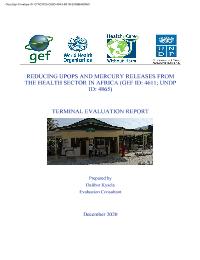
Final Evaluation of Reducing UPOPs and Mercury Releases from the Health Sector in Africa project (Medical Waste Management)
Completedon 31 Dec, 2020
Evaluation Plan
Planned End Date
Oct 2020
Evaluation Type
Project
Management Response
Yes (Partial)
Evaluation Budget
$50,000
Evaluation Title
Final Evaluation of Reducing UPOPs and Mercury Releases from the Health Sector in Africa project (Medical Waste Management)
Atlas Project Number
87064
Plan Period
Status
Completed
Type
Project
Plan Date
31 Oct, 2020
Completion Date
31 Dec, 2020
Budget
$50,000
Expenditure
$50,000
Source of Funding
Project Budget, Donor
Management Response
Yes (Partial)
Quality Assessment
No
Joint Programme
No
Joint Evaluation
No
GEF Evaluation
Yes
Expand
Stakeholders
Ministry of Mines, Energy and Water Development (MMEWD), Ministry of Chiefs and Traditional Affairs (MOCTA), Ministry of Agriculture and Livestock (MAL), Zambia Meteorological Department (ZMD), Serenje District Council, District Council of Chiefs, and Zambia Climate Change Network (ZCCN)
Countries
Zambia
Atlas Project Number
87064
Plan Period
Status
Completed
Type
Project
Management Response
Yes (Partial)
Plan Date
31 Oct, 2020
Quality Assessment
No
Completion Date
31 Dec, 2020
Joint Programme
No
Joint Evaluation
No
Budget
$50,000
GEF Evaluation
Yes
Expand
Expenditure
$50,000
Stakeholders
Ministry of Mines, Energy and Water Development (MMEWD), Ministry of Chiefs and Traditional Affairs (MOCTA), Ministry of Agriculture and Livestock (MAL), Zambia Meteorological Department (ZMD), Serenje District Council, District Council of Chiefs, and Zambia Climate Change Network (ZCCN)
Source of Funding
Project Budget, Donor
Countries
Zambia
Output 2.1.1 Low emission and climate resilient objectives addressed in national, sub-national and sectoral development plans and policies to promote economic diversification and green growth
Goal 13. Take urgent action to combat climate change and its impacts
13.2 Integrate climate change measures into national policies, strategies and planning
1: Others
2: Poverty


